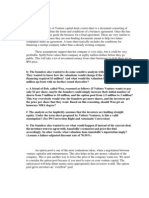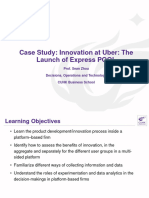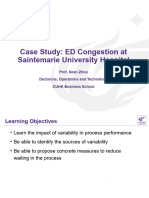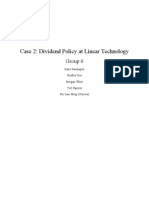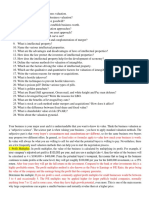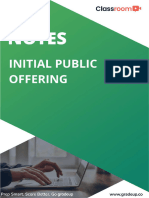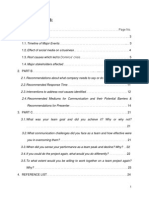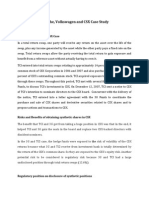Jet Blue IPO Case
Jet Blue IPO Case
Uploaded by
divakar62Copyright:
Available Formats
Jet Blue IPO Case
Jet Blue IPO Case
Uploaded by
divakar62Original Description:
Copyright
Available Formats
Share this document
Did you find this document useful?
Is this content inappropriate?
Copyright:
Available Formats
Jet Blue IPO Case
Jet Blue IPO Case
Uploaded by
divakar62Copyright:
Available Formats
Jet Blue Airlines
JetBlue is a low cost airline that was incorporated in Delaware in August, 1998 .
JetBlues main idea was to offer low cost but comfortable services to the
customers through strategies like point-to-point travel.
This case analyses JetBlues decision to make their initial public offering(IPO)
months after the terrorist attacks of 2001. The initial price range for JetBlue
shares, communicated to potential investors, was $22 to $24. Facing sizable
excess demand for the 5.5 million shares planned for the IPO, management had
recently filed an increase in the offerings price range($25 to $26). JetBlues lead
underwriter was Morgan Stanley and the co-lead manager was Merrill Lynch &
Co.
Advantages and Disadvantages of an Initial Public Offering
Advantages:
1) A small company, which wants to further its growth, seeks an IPO to gain
the capital required for that growth. This acts as a distinct advantage.
The gained capital can be used for research and development purposes.
Some even use it to clear the previous debts if any. There is stock value
appreciation if the company performs well after going public. The prices
of the stocks tend to increase and attract more investors.
2) The publicity that a company gains through an IPO acts in the benefit of
the company in more ways than one. People get aware of the company,
especially if its a startup. The company targets future potential owners
through an IPO, which could help them establish themselves in the
market.
3) The company has access to financial market for future capital needs.
Once the company has gone public using IPO, it gets open to the public
and to the financial market as well to turn up to whenever required.
4) In addition to the better promotion and establishment of the company in
the market, the company gets attracts better personnel which may
including high level executives and officers. With a better team working
at the company, the company can expect better results which in turn
could increase the stock value of the company.
5) Once the company is public, there is increased exposure for the company
in every way. From facing new companies to releasing new products,
every aspect nurtures the company to grow more.
6) Liquid Equity is another great benefit of going public with your company.
When a company goes public, the shares can be used as or turned into
cash for various purposes such as paying debts, acquiring new business
and more.
7) Going public attracts lots of media spotlight. It attracts more investors,
personnel, people start to talk about the company more.
Disadvantages:
1) Going public is an expensive process, the costs of which can range from
$250,000 to $1 million. If a company has other ways to raise capital, they
often do not go public to save and eventually generate more capital. To
use an IPO, that much investment is required. If the offering is rejected,
then the invested amount goes to waste. So companies, especially the
startups have to think twice before going public. If its the offering is
accepted, it may go in their favor but it is a huge risk as well keeping in
mind the money that is involved.
2) A company is required to disclose all its financial information while going
public. Where all the expenditure has been used needs to be clearly
stated. Any wrong information in the same could lead to the offering
being rejected.
3) There is an increased risk of exposure of civil liabilities to public
companies, executives and directors for false or misleading statements in
the registration process.
4) It is not an easy process while registering for the offering keeping in ming
the legal process. Sometimes, the management of the company seeking to
use an IPO is not familiar with the whole process of going public, this may
cause problem both time wise and efficiency wise.
5) Public companies are often at risk of takeover attempts. Once a company
is public, it becomes open to the market in every way. It does attract
qualified personnel but it also attracts big companies, which are looking
to expand their company. The company going public, should have a
staggered board of directors as an anti take over measure.
6) Meeting the funding targets is another issue that comes up while going
public. There is a high risk that funding targets may not be met. If that is
the case, the company may have to stop the IPO process in between and
the money invested till then would be lost.
7) Once the company goes public, it attracts high officers and executives.
There are more people who want to become a part of the company
especially if the company is doing well after going public. There is a
chance that the company loses control over its employees and in general
in the market. From managing a startup to suddenly being so open in the
market can be a huge task for most companies.
Relative Valuation
P/E Multiple
With earnings per share of $1.14 and using the average P/E multiple of the four
major competitors of JetBlue, JetBlues price per share based on leading
financials would be $30 per share. Similarly using the trailing financials, JetBlues
price per share would be $36 per share.
Trailing Leading
PE
Multiple
PE
Multiple
AirTran 25.3 20.0
Frontier 8.4 45.9
Ryanair 44.0 34.1
Southwest 27.6 28.4
26.3 32.1
JetBlue's EPS 1.14 1.14
JetBlue share
price 30.00 36.61
Conclusion
From the analysis of the company using the Method of Comparables, it is
concluded that JetBlue airways IPO is significantly underpriced and should be
within the price range of $28 to $30. This range has been kept conservative to
make sure that the company enjoys the benefits of underpricing like generating
goodwill, access to future capital and targeting uninformed investors. The
current suggested price of $25 to $26 is hence inappropriate and would lead to
too many opportunities being missed.
You might also like
- West Teleservice: Case QuestionsDocument1 pageWest Teleservice: Case QuestionsAlejandro García AcostaNo ratings yet
- Porter Five Forces Analysis Steel IndustryDocument8 pagesPorter Five Forces Analysis Steel Industrydivakar62100% (3)
- Hill Country Snack Foods Case AnalysisDocument5 pagesHill Country Snack Foods Case Analysisdivakar62No ratings yet
- Group 7 - Case 2 - Innovation at UberDocument4 pagesGroup 7 - Case 2 - Innovation at Uberishaan.mba22261No ratings yet
- Sun Brewing Case ExhibitsDocument26 pagesSun Brewing Case ExhibitsShshankNo ratings yet
- Case 5 Midland Energy Case ProjectDocument7 pagesCase 5 Midland Energy Case ProjectCourse HeroNo ratings yet
- Statements 3750Document6 pagesStatements 3750ytprem agu100% (2)
- Marks and SpencerDocument25 pagesMarks and SpencerNeha khanNo ratings yet
- JetBlue Airways IPO ValuationDocument9 pagesJetBlue Airways IPO ValuationMuyeedulIslamNo ratings yet
- JetBlue Airways IPO ValuationDocument5 pagesJetBlue Airways IPO ValuationOrrathai Buanual88% (8)
- Nike Case StudyDocument5 pagesNike Case StudyxluciastanNo ratings yet
- Sally Jameson CaseDocument2 pagesSally Jameson Casemaniaa545No ratings yet
- Jacobs Division PDFDocument5 pagesJacobs Division PDFAbdul wahabNo ratings yet
- Write UpDocument3 pagesWrite UpDoritosxuNo ratings yet
- Michael McClintock Case1Document2 pagesMichael McClintock Case1Mike MCNo ratings yet
- Integrative Case 10 1 Projected Financial Statements For StarbucDocument2 pagesIntegrative Case 10 1 Projected Financial Statements For StarbucAmit PandeyNo ratings yet
- Case Write Up-JetBlueDocument13 pagesCase Write Up-JetBluesreen2r100% (1)
- JetBlue IPO ReportDocument12 pagesJetBlue IPO ReportMuyeedulIslamNo ratings yet
- Facebook IPO caseHBRDocument29 pagesFacebook IPO caseHBRCrazy Imaginations100% (1)
- Jet IPO ValuationDocument2 pagesJet IPO Valuationprtkshnkr50% (2)
- Bed Bath Beyond (BBBY) Stock ReportDocument14 pagesBed Bath Beyond (BBBY) Stock Reportcollegeanalysts100% (2)
- Uber SlidesDocument29 pagesUber Slidesbingcheng HuNo ratings yet
- Jetblue Airways Ipo ValuationDocument6 pagesJetblue Airways Ipo ValuationXing Liang HuangNo ratings yet
- Sante Marie Univ HospitalDocument28 pagesSante Marie Univ Hospitalbingcheng HuNo ratings yet
- JetBlue Airways IPO ValuationDocument15 pagesJetBlue Airways IPO ValuationThossapron Apinyapanja0% (2)
- Case Study Que of AirthreadDocument1 pageCase Study Que of AirthreadSimran MalhotraNo ratings yet
- BCE: INC Case AnalysisDocument6 pagesBCE: INC Case AnalysisShuja Ur RahmanNo ratings yet
- Debt Policy at Ust Inc Case AnalysisDocument23 pagesDebt Policy at Ust Inc Case AnalysisLouie Ram50% (2)
- Buffett CaseDocument15 pagesBuffett CaseElizabeth MillerNo ratings yet
- Initial Public Offering of FacebookDocument6 pagesInitial Public Offering of FacebookAkhil Uchil100% (1)
- LinearDocument6 pagesLinearjackedup211No ratings yet
- Netscape ProformaDocument6 pagesNetscape ProformabobscribdNo ratings yet
- Newell Case StudyDocument1 pageNewell Case StudyNaina AgrawalNo ratings yet
- Debt Policy at Ust IncDocument18 pagesDebt Policy at Ust InctutenkhamenNo ratings yet
- Case Study Analysis: Chestnut FoodsDocument7 pagesCase Study Analysis: Chestnut FoodsNaman KohliNo ratings yet
- Just DialDocument50 pagesJust Dialsili core100% (1)
- USTDocument4 pagesUSTJames JeffersonNo ratings yet
- The Battle For Value Fedex Vs UPSDocument10 pagesThe Battle For Value Fedex Vs UPSAbdul Wajid Zafar100% (1)
- JetBlue SpreadsheetsDocument6 pagesJetBlue SpreadsheetsZhuo LuNo ratings yet
- Final AssignmentDocument15 pagesFinal AssignmentUttam DwaNo ratings yet
- Case Study - Linear Tech - Christopher Taylor - SampleDocument9 pagesCase Study - Linear Tech - Christopher Taylor - Sampleakshay87kumar8193No ratings yet
- Arcadian Business CaseDocument20 pagesArcadian Business CaseHeniNo ratings yet
- Sealed Air Corporation-V5 - AmwDocument8 pagesSealed Air Corporation-V5 - AmwChristopher WardNo ratings yet
- FY07FY Financial Management and PoliciesDocument5 pagesFY07FY Financial Management and Policiesjablay29030% (1)
- Questions For Case AnalysisDocument3 pagesQuestions For Case AnalysisDwinanda SeptiadhiNo ratings yet
- Airbus A3XX Case QuestionsDocument1 pageAirbus A3XX Case QuestionsPradnya SalveNo ratings yet
- CESIM CaseDocument8 pagesCESIM CaseDhawal PanchalNo ratings yet
- Sealed Air Corporation v1.0Document8 pagesSealed Air Corporation v1.0KshitishNo ratings yet
- Questions - Linear Technologies CaseDocument1 pageQuestions - Linear Technologies CaseNathan Toledano100% (1)
- Ameritrade Case SolutionDocument34 pagesAmeritrade Case SolutionAbhishek GargNo ratings yet
- California Pizza Kitchen Rev2Document7 pagesCalifornia Pizza Kitchen Rev2ahmed mahmoud100% (1)
- FS Mo IiiDocument67 pagesFS Mo Iiiarul kumarNo ratings yet
- UST IncDocument16 pagesUST IncNur 'AtiqahNo ratings yet
- Leveraged Recapitalizations and Exchange OffersDocument5 pagesLeveraged Recapitalizations and Exchange OffersAfiaSiddiquiNo ratings yet
- Corporate Financial Analysis with Microsoft ExcelFrom EverandCorporate Financial Analysis with Microsoft ExcelRating: 5 out of 5 stars5/5 (1)
- Jet AssignmentDocument4 pagesJet Assignmentsunil kumarNo ratings yet
- WorkDocument52 pagesWorksara anjumNo ratings yet
- IBDocument3 pagesIBNicole sadjoliNo ratings yet
- JetDocument5 pagesJetsunil kumarNo ratings yet
- Simarleen Kaur 0424Document4 pagesSimarleen Kaur 0424simar leenNo ratings yet
- Financing A New Venture Trough and Initial Public Offering (IPO)Document32 pagesFinancing A New Venture Trough and Initial Public Offering (IPO)Manthan LalanNo ratings yet
- New Microsoft Word Document 8 66Document6 pagesNew Microsoft Word Document 8 66Balraj PrajeshNo ratings yet
- The Components of IPO Valuation: DemandDocument8 pagesThe Components of IPO Valuation: DemandRameezNo ratings yet
- Coke Vs PepsiDocument9 pagesCoke Vs Pepsidivakar62100% (1)
- Dominos CaseDocument25 pagesDominos Casedivakar62100% (1)
- Porsche Volkswagen Case StudyDocument3 pagesPorsche Volkswagen Case Studydivakar62No ratings yet
- Solved Guardsmark A Private Security Company Hired Kadah As A SecuritDocument1 pageSolved Guardsmark A Private Security Company Hired Kadah As A SecuritAnbu jaromiaNo ratings yet
- PDF Chapter 13 Developing The Overall Audit Plan and Audit Program PDF CompressDocument28 pagesPDF Chapter 13 Developing The Overall Audit Plan and Audit Program PDF CompresscleaNo ratings yet
- Rule 129, Section 4 - Republic Glass vs. Qua - Weill, Ann LaurenDocument7 pagesRule 129, Section 4 - Republic Glass vs. Qua - Weill, Ann LaurenannlaurenweillNo ratings yet
- Applicability of Caro, 2020Document19 pagesApplicability of Caro, 2020hrudaya boysNo ratings yet
- Pas 1: Presentation of Financial StatementsDocument16 pagesPas 1: Presentation of Financial StatementsKryzzel Anne JonNo ratings yet
- Business PlanDocument6 pagesBusiness PlanFernan LagmanNo ratings yet
- Him Adri 2010Document75 pagesHim Adri 2010Jupe JonesNo ratings yet
- Standalone Financial Statements (1) Pages 1Document2 pagesStandalone Financial Statements (1) Pages 1sqxxsnnfdgNo ratings yet
- CupzzaDocument61 pagesCupzzaChristine FaurilloNo ratings yet
- Transaction Code For Account Payable in SAPDocument4 pagesTransaction Code For Account Payable in SAPsridharNo ratings yet
- A Company Analysis Not Fast, Just FuriousDocument16 pagesA Company Analysis Not Fast, Just FuriousMark Joseph50% (2)
- Our Core Practices: 1. Allegations of Misconduct 2. Authorship and ContributorshipDocument1 pageOur Core Practices: 1. Allegations of Misconduct 2. Authorship and ContributorshipRaphael AndradeNo ratings yet
- Architect Services Agreement: This Packet IncludesDocument24 pagesArchitect Services Agreement: This Packet IncludesRevin Vincere CaralipioNo ratings yet
- Iso 9001 FileDocument2 pagesIso 9001 FileAriane Jill HipolitoNo ratings yet
- MBA Complete Assignment - 16112020Document31 pagesMBA Complete Assignment - 16112020KD TricksNo ratings yet
- Paint Sector - Apr16 (IC) PDFDocument93 pagesPaint Sector - Apr16 (IC) PDFnadekaramit9122No ratings yet
- Resumos LogísticaDocument19 pagesResumos LogísticaLuís FernandesNo ratings yet
- Business ValuationDocument11 pagesBusiness ValuationAhmed Raza100% (1)
- Assignment - EquityDocument5 pagesAssignment - EquityTaha JavedNo ratings yet
- DEPLETIONDocument17 pagesDEPLETIONKylie Luigi Leynes BagonNo ratings yet
- Special Valuation Branch-CustomsDocument6 pagesSpecial Valuation Branch-CustomsRaj Angchekar100% (1)
- Certificate: Ca Vinay TotlaDocument2 pagesCertificate: Ca Vinay TotlaVinay TotlaNo ratings yet
- Wireless Ear BudsDocument1 pageWireless Ear BudsMadhusudan RathiNo ratings yet
- Data Architecture Project Presentation - Modern StatspptxDocument21 pagesData Architecture Project Presentation - Modern StatspptxPatricio Ernesto RepettoNo ratings yet
- Des Marketing, Inc.: Charge Sales InvoiceDocument1 pageDes Marketing, Inc.: Charge Sales InvoicembyedithNo ratings yet
- Element 3 - Environmental Management SystemsDocument47 pagesElement 3 - Environmental Management SystemsAla Eldin Yassen100% (1)
- Akhil V P - P.reportDocument37 pagesAkhil V P - P.reportOshima MirzaNo ratings yet














